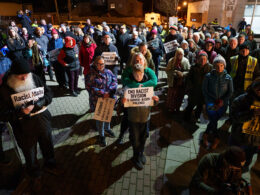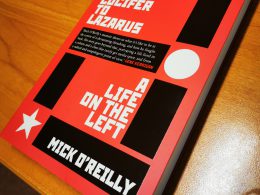By James McCabe
Daniel O’Connell, the leader of the 19th-century fight for Catholic Emancipation in Ireland, is revered by liberals as a champion of equality and social justice. However, two features of this much-celebrated but contradictory figure in Irish history are rarely commented upon. These are:
1) His laudable activities for the abolition of slavery; and 2) His awful sentiments against workers’ rights.
Opposing oppression
Black American abolitionist Charles Lenox Remond first met Daniel O’Connell at the World Anti-Slavery Convention in London in 1840. After hearing O’Connell speak and reading his anti-slavery writings, Remond stated that “no country or people possess a superior to Daniel O’Connell.” Remond went on to embark on a speaking tour around Ireland, collecting signatures for an anti-slavery petition known as the Irish Address. As Remond left for America after collecting over 60,000 signatures, he said, “Never were my hopes higher, my expectations stronger, or my zeal more ardent than at present.”.
Another American abolitionist, Frederick Douglass, had been born into enslavement, but had self-emancipated seven years before he visited Ireland for an anti-slavery speaking tour in 1845. He attended a meeting of the Irish nationalist Repeal campaign in Dublin, where he spoke alongside Daniel O’Connell, telling the audience that his fellow enslaved people needed a “black Daniel O’Connell” to help organise a movement to overthrow the system of slave labour in America.
O’Connell also campaigned against the colonial oppression and violence that the British army perpetrated on the people of India and the indigenous communities of Australia. O’Connell said, “There is something Irish at my heart, which makes me sympathise with all those who are suffering under oppression.”
Establishment figure
Born in Kerry in 1775 to a relatively wealthy family, O’Connell had access to educational and professional opportunities that were barred to most Irish Catholics. At the time of his birth, only 5% of Ireland’s land was owned by Catholics, even though the vast majority of the island’s population was Catholic. A discriminatory Penal Law system operated in Ireland at this time, which elevated the Anglican Church and imposed restrictions on Catholics learning to read and write; serving on juries; entering certain trades and professions, voting in elections, or sitting in the British Parliament.
His experience of the injustice of the Penal Law system and the colonial exploitation of Ireland left him with a lifelong opposition to institutional discrimination against oppressed groups. However, being a pro-capitalist liberal, he defended the fundamental economic inequalities of capitalism.
He had a deeply conservative fear of the power of mass movements. During the 1798 Rebellion led by the United Irishmen, O’Connell joined the Lawyers’ Artillery Corps, whose aim was to suppress the uprising on behalf of the British state. He famously led a campaign for legal equality for Catholics, but when the movement turned into a more militant struggle by small farmers and rural labourers to refuse to pay tithes to the Anglican Church, O’Connell wrote to the British Lord Chancellor Duncannon to encourage him to send British troops to suppress the movement, arguing “the more troops sent over here the better.” O’Connell promised, “I will use all my influence to stop the career of those who are engaged in urging on the people.”
Anti-trade union
Irish socialist James Connolly documented the most shameful aspects of O’Connell’s legacy in his book Labour in Irish History. In an anti-trade unionist speech in the House of Commons, O’Connell claimed, “there was no tyranny equal to that which was exercised by the trade unionists in Dublin over their fellow labourers.” He even went as far as to oppose a ruling by Parliament that sought to ban the employment of children under nine years of age in factories! He argued that the government should not “go about parading before the world their ridiculous humanity, which would end by converting their manufacturers into beggars.”
With his critiques of injustice on the one hand while at the same time defending the fundamental nature of the rotten capitalist status quo on the other, it’s no wonder O’Connell appeals to many liberal politicians and media pundits today.











